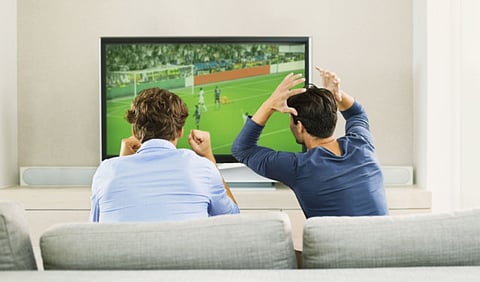Gulf office workers 'planning World Cup sick days'
New poll says some will take day off or call in sick after late night games

Dubai: Staff productivity will drop with workers in the Middle East watching late night World Cup football matches on TV, a new poll suggests.
Some professionals will come in late the next day while others will call in sick or take a day off, the Gulf Talent survey said on Monday.
A third will watch highlights at work or discuss matches with colleagues.
The study by the online job agency polled 18,000 professionals in 10 Middle Eastern countries ahead of the World Cup, to be held from June 12-July 13 in Brazil.
The tournament will be aired live from 8pm-4am in the UAE. Other regional countries will catch the action at around the same time.
Half of all employees plan to view late-night matches involving their favourite teams, and almost 90 per cent plan to watch at least some games.
About 10 per cent said they would report late to work to catch up on sleep, while a similar number will take a day’s annual leave after watching late night matches.
Meanwhile, three per cent of professionals plan to call in sick so they won’t have to go to work.
However, not everyone plans to cut corners – about one-third of respondents said that they will cut down on sleep to make it to work on time.
The poll found IT professionals to be more likely than others to come to work late or call in sick. By comparison, HR professionals were most likely to take a day’s annual leave, while marketing professionals were more likely to lose sleep and come to work tired.
“The World Cup comes every four years. As a diehard fan, I don’t mind losing sleep over it. For the really late matches, I’ll sleep for three hours, get up and go to work,” said Lebanese expat Hassan Ahmad.
This year, the World Cup and Ramadan will overlap in the last half of June. In the UAE, working hours are shortened by a few hours, with offices generally starting late and ending early.
Some football fans welcome that arrangement even more his year.
“You’re up late and sleep in anyway in Ramadan, that’s going to make it easier to slide into World Cup mode. I’m going to take it easy on my staff,” said British businessman Mohammad Omar, 38.
Some professionals, like Dubai resident Mohammad Khamis, 27, plan to report dutifully to work regardless of how sleepy or tired they might be. Khamis, who is a risk analyst, said he aims to “make a good impression at work”, especially as he is starting a new job.
“You can nap after work, get up for the match, and go back to sleep. You have to plan,” he added.
Still, the report said, some employers are concerned about the impact on productivity. A manager at an oil and gas company said: “I have 50 employees in my team. Most of them are football fans and this will really affect our productivity this month.”
Others are relaxed – even optimistic – about the football season. A manager at a Saudi catering firm said: “Staff productivity is highly dependent on emotions. We can properly transform these emotions during this time in a positive manner to increase productivity. So I would allow my staff time to watch their favourite matches.”
According to Gulf Talent, productivity loss for Middle East companies may not be as severe as their European counterparts, as all the games fall outside usual working hours. Also, the company note, there is “negligible consumption of alcoholic beverages, a main driver of World Cup-related sicknesses”.
With inputs from Jumana Khamis and Bassam Za’za’, Staff Reporters

